- Home
- Frank P. Ryan
The Jo Fletcher Books Anthology Page 9
The Jo Fletcher Books Anthology Read online
Page 9
The men howled with laughter. ‘Fair enough – for a freak,’ Garvey shouted back, the stunner in his hand once more crackling at the tip. He moved as though to go for Lyriam, still halfway between them and the warehouse. The men were all turned towards him now, and they did not see, as Lyriam did, the violet glow move in a short sharp arc: like the turn of a head when the person upon whose shoulders it sits shoves at something large, and heavy.
They only knew the grinding and crashing sounds behind them as some boxy item, big enough to hold a body and shining white in the gloaming, came tumbling into their midst. There was a shriek of metal on metal as the pile from which it had been pushed destabilised and toppled. They screamed and scattered. Lyriam saw two men collide and fall, and another knocked off his feet by the impact. Most of them had cleared the area in the nick of time, but they were not entirely unscathed.
Some of them glimpsed the violet-topped shadow that leaped clear of the collapse, and disappeared behind another pile of trash.
‘Fuck!’ screamed one of the newcomers. ‘Bitch is tryin’ to kill us!’
‘So?’ her voice came back at them, from somewhere behind or between the mounds of rubbish. It was hard with rage. ‘Wasn’t that your plan for us?’ Lyriam thought she had moved back towards the warehouse, further away from the gate.
‘It fucking is now!’ Dirk screamed into the night. ‘You freak, when I get my hands on you . . .’
‘I know all about what you like to do with your hands, Dirk.’ The calm in her voice terrified Lyriam more than anything else. Violet glinted behind a stack of wooden crates, in his eye line, but not theirs. He thought she glanced towards him, and then the voice came again: ‘Lyriam, we’ll be leaving soon. Time to get your coat.’
They shouted incredulous oaths at that, but they had her location now, and surged towards it.
‘Somebody grab the boy,’ Garvey growled, and Dirk changed direction, heading for Lyriam, glancing back as somebody yelled. She had leaped up onto the topmost crate, a tall man’s height above the ground. They heard her shout ‘Go,’ and Lyriam went, but not before he’d seen her come crashing down feet first on top of Dirk, and heard his scream.
Then he was back inside the blackness of the warehouse, quailing at the thought of what might be happening behind him, where there were grunts and shouts and the sound of blows; but knowing, too, that she had maneuvered events precisely towards this outcome.
Don’t worry, don’t wait, don’t try to help. Those were his instructions. The first was impossible, but he thought he could manage the other two. He snatched his coat from its rusty nail and grabbed the guitharp.
Behind him, shouts of, ‘Grab her! Don’t let her get away!’ sounded.
There were running feet at the warehouse entrance, and her voice, a hint of strain in it now, shouting, ‘C’mon boys, back to work! Come join us!’
Gods and monsters, she was leading them inside. Did she hope to separate them, hunt them down one by one between the bales and barrels? That plan could so easily be turned against her. Garvey and Dirk knew the place well, and maybe the others did too. But she must think she could use it somehow . . .
Lyriam remembered what else she had said; and though he did not know, could not imagine what she had meant, he ran without further thought, following the line of shelves as instructed until he collided with a deeper blackness. Behind him, shouts and jeers told him that at least some of the men were now inside, spread out and moving through the labyrinthine, crowded space, searching, chasing. He turned right, following the barrier – it felt like long rolls of something, maybe a stack of old carpets – until it ran out, then turned left into a short, cluttered passage. He stumbled, and a shiver of notes erupted from the case in his hand. In his panic he thought he should drop it; he would be lighter and faster, and it might trip whoever was coming in his wake. But the message must have got confused between his brain and his fist, because when he slammed up against the door and charged out into the darkened yard he was still holding it, his fingers locked around the straps, the case banging against his side as he scrambled away, turning to look back at the warehouse.
He could still hear shouts through the open door, things falling, the sounds of another fight. Up against the fence now, crouched behind a stinking mass of rotted plastic-weave bags, he struggled into his coat, trying to keep the doorway in sight. The sounds were getting closer as he shrugged his arms through the shoulder straps of the case. Somehow he could no longer even imagine leaving it behind. He began to feel his way along the fence, towards the front, trying to listen and look ahead to where some of the men might still be lying in wait; and behind, to whoever else might emerge through the door.
He had made it halfway when he heard a loud pop, like something he remembered from vid hour in the crèche, rumbling out through the early night. It came from above, near the roof of the warehouse, and he looked up at the deeper darkness of it against the sky. Another pop, and another in quick succession, and the skylight glass shattered all along the length of the roof. Another pop, and this time he thought he could see a puff of dust erupt out of one of those gaping holes; and as he strained his eyes in the dark he saw the entire roofline begin to waver.
He knew what she had done, then, and he turned and ran for the deeper cover of the yard in front.
She was a miner. He had seen those vids too, meant to teach gems about others of their kind. Maybe that was where he recognised the popping sound from. He knew about their work, up mountains and down shafts, before the casualty rates became so high the government had been forced to step in. She would know how to do it, how to identify the weak spots, set off charges, open up cracks along the lines of least resistance.
He remembered the quilted jacket that had looked less full at the end of the day than the beginning, and the thing that had disappeared into her pocket: not quite like a memtab or a credit tab, but a lot like some kind of transmitter. He wondered where, in the middle of London, she had got hold of the explosives.
He threw himself into the furthest corner, between the front railings and the side fence, huddling in the shelter of a pile of boxes that he had spent the day discarding, and listened as the building behind him collapsed. If there were screams he did not hear them, and there was no other sound or movement near him, no shouts or curses. When the tortured roar of falling metal and glass and mortar finally echoed away into nothing, and he peered from his hiding place across the yard to where the warehouse had been, he saw in the dim light from the street the greatest pile of rubble yet, compacted to half its original height; but no sign of life.
He looked the other way, along the narrow side yard towards the rear of the destroyed building, rising into a crouch as he did so, feeling the unfamiliar, comforting bulk of the guitharp on his back. He thought that he caught, in the dark and the billowing dust, a flickering glimpse of violet.
*
On the way to the gate, hurrying and stumbling over the mountains of rubbish which had themselves been scattered by the shockwave or ejected through the open doorway, he finally saw a body: Dirk, facedown and bloody, one arm twisted awkwardly behind him. He was too far away to have been inside when the building fell. Lyriam could not tell whether he was alive or dead, and did not stop to check.
So Biane had reduced the odds by at least one, and led the rest inside, and brought their own house down on them. If she had failed to make it out then there was nothing he could do for her anyway. If she had escaped, racing ahead to burst through the back door just in time, she too would now be away: over the side fence or picking her way towards the front.
She did not expect him to wait. She had told him not to wait. And he knew that she was right: it would be better by far for them not to meet, to go their separate ways, never see each other again nor speak of this night to anyone.
He turned at the gate, glancing back one last time. There was still no sign of her. He fel
t the weight of her gift on his back.
He would have to come up with a story for that. Not the truth, but maybe something close enough to be believed; something that would honour her just a little bit. He would think about it tonight, in the park.
He slipped between one poor pool of light and the next, turned a corner, and disappeared into the dark.
Stephanie Saulter writes what she likes to think is literary science fiction. Born in Jamaica, she earned her degree at MIT and spent over a decade in the United States before moving to England in 2003. She’s best known as the author of the ®Evolution trilogy: Gemsigns, Binary and Regeneration are set in a near-future London, and use the lens of an altered humanity to take a new look at the old issues of race, class, inequality and social conflict. Stephanie blogs unpredictably at stephaniesaulter.com and tweets slightly more reliably as @scriptopus. She lives in London.
Frontsman • David Towsey
Frontsman
David Towsey
Omaro had asked for help twice in his thirty-nine years. That didn’t shame him. He was a man who’d fought the mountain tribes from the back of a tusker and on foot: a frontsman. The night before each battle he slept soundly. From the middle of the line he’d bellowed loud enough to send fruit tumbling like the clouds had opened. His own men quaked, then cheered, then fought like red-winks, teeth bared. He’d asked for help twice, once for each time he chose a wife. That didn’t shame him.
He blew air out of his large cheeks and raised his mai-stick once again. It was solid and round in his hand; its chipped and blunt end had finished many things. Many men. Harder to begin things with a mai-stick – neither it nor Omaro were built for that. But here he was.
He knocked on a rock. The hollow, wooden clunk echoed in the mouth of the cave. When the sound was gone and the jungle resumed its whispering, he knelt in the way befitting a frontsman. He didn’t lean on his mai-stick, like a spineless elder; fourteen times he had ventured to where the sun rises. His pouch had knucklebones and teeth, polished and cleaned, as was right. Some of the teeth were as long as a finger, such were the men he’d faced. Those trophies had taken years to acquire, and those years were beginning to weigh heavily on him. As a younger man he had waited, kneeling on the bare earth just so, for a day and a night. Now, he had to ignore the flaring protest of his ankles.
That Violine would keep him waiting was understood. He lost nothing in his sitting. He faced the sun; letting the dying god warm his skin. Violine’s cave was a good walk from the village. When there was a breeze, noises were carried to him – the pounding of meal and the braying laughter of the idle. Omaro sucked at the sore near the roof of his mouth. Too many sons laughed when there was serious work to do. Too many daughters pounded meal instead of taking to the ring. Others saw it too, what for Omaro was plain as a wailer’s call, but too many were deaf and blind. He shifted at the thought of it, and then cursed himself for showing weakness. Violine would be watching.
Maybe she would know his fidgeting was for the tribe, maybe she’d think he was weak. She’d clapped with the rest of them when he brought Pirro to the ground, the festival before last, but she collected no winnings from his victory – so few did. Pirro had a big mouth and big shoulders and Violine should have known better. She didn’t smile as she clapped; so few did.
When the sun slept, he stood. His brow furrowed as if the nearby trees had asked him of their dreams and what they might mean. The feeling in his toes was slow to return.
There were baskets at the cave-mouth, woven, painted and placed by young women, daughters: gifts to hold gifts. He had brought trinkets that caught the light of the stars; useless things that his wives liked but wouldn’t notice were gone. He held them over the baskets, but stopped. He gazed into the empty cave and knew she was watching. The question was in the cooling air: if not another wife, then why was he there? He knelt and placed his mai-stick carefully across the baskets. It would be understood.
He made his way back down to the village. He didn’t turn to look, but knew she was there at the cave. Her hands would be running over the uneven wood of his offering. He was asking for help for the third time in his thirty-nine years, and that didn’t shame him.
*
His first wife placed a bowl at his feet. Omaro shook his head; he didn’t care for fruit that morning. His second wife brought porridge. He caught her wrist. Her eyes grew wide and she tried to back away but she was too small to move him; more chance of moving a sleeping tusker. He forced her fingers into the porridge and when she didn’t cry out, he let her go. He ate the porridge and his wives left to pursue whatever it was they filled their days with.
‘Tajo!’ he said. His voice rumbled through the ground, out of the hut and shook the trees awake.
His son waited at the threshold, filling less of the entrance than his wives did.
‘Come here, Tajo.’
Head bowed, his son stood before him. Omaro watched his ribs closely, though at sixteen there should be no ribs to see – didn’t the boy eat enough? At least he wasn’t trembling. Omaro pinched the boy’s mai-arm. He slapped the boy’s buttocks and felt a sharpness against his palm.
‘Sixteen,’ Omaro said.
‘Yes, Father,’ Tajo said, though it wasn’t a question.
Omaro cupped the boy’s balls and was unimpressed with what he found. ‘The winds blow fiercely at the base of the mountains. They would chase you home.’
‘I will save them the trouble and stay here,’ Tajo said.
Omaro leaned forward and took the boy’s feet out from under him, scattering the bowls.
Tajo remained on the ground, surrounded by fruit, propped up on his elbows. His pointy, spiny elbows.
‘I will save you the trouble!’
‘Yes, Father.’
Omaro waved his son away; Violine would see him today.
*
The climb to her cave was worse without his stick, but he didn’t rest, though his breath was short and sweat lined the folds in his belly. It was hot today – hotter than the day before, perhaps the hottest day of the season. When he reached the cave, he turned back and counted twenty paces. There he stood until he breathed easy and his skin had cooled.
The baskets were empty. He had no way to knock so he knelt in the way befitting of a frontsman.
He didn’t hear her approach. One moment she was not there, the next she was, as was her way. Kneeling, he was eye-to-eye with her. He didn’t like it, but he was the one in need of guidance. She held his mai-stick as if it were her own, as if she’d up-ended Pirro herself, as if she had broken mountain skulls.
‘You look restless, Omaro who throws berns, rides tuskers, sleeps with two wives.’
‘My son: he has elbows like yours.’
Violine was naked except for a crown of husht teeth.
‘And he has as many ribs as you do,’ he said.
‘We all have so many ribs, Omaro, even frontsmen like you,’ Violine said. She was quick. She jabbed a hand underneath his breast and pain bloomed like a water lotus. ‘One,’ she said.
He held up a hand. ‘How easily we forget,’ he said, with an uneasy smile. ‘I will count the others myself.’
‘You come talking of sons and not wives,’ Violine said.
‘Son. I have only one.’
‘Then make more.’ She turned to go.
‘My wives are too old.’
‘Then take another.’
‘Two is enough,’ he said.
‘I told you last time one was enough. You make your own choices, Omaro.’
He opened his mouth and then closed it. He shifted until he sat as a woman would and rubbed his swollen red ankles. He could feel her smiling.
‘I don’t know what to do,’ he muttered. ‘Tajo will never step the mai. How could he hold a line with such elbows?’
Violine sat by him as a neighbour
might and he stiffened, which made his one rib throb more. At least his ankles were quiet.
‘You have Dorsey; she approaches like a herd. Whenever I see her I pity the mountain folk.’
‘She brings me great pride.’
‘And Alvi doubled my winnings last festival.’
Omaro laughed. ‘There’s still talk, the talk like wailers make, that you bewitched the circle that day. Alvi was half that girl’s size.’
‘Laugh, Omaro – find joy in all your children.’
Violine tried to stand, but he stopped her. His hand engulfed her shoulder. Her bones were so delicate, like the wings of a painter.
‘He’s my only son.’
Violine snorted like a tusker. ‘Well, what does the boy want to do?’
‘Want?’ Omaro said.
‘Yes, want? When you dreamed of frontlines, small mountain girls and a bloodied mai-stick – what does Tajo see behind his eyes?’
‘I don’t know.’
Violine left him. He rolled that word around his big teeth: want. She said it one way, he said it another, and now it felt like a different word altogether. He thought about it the rest of the morning and long into the afternoon. His stomach tried to distract him so he chewed some leaves until it was silent. Before the sun god died, he ambled back to the cave mouth. He still had his wives’ trinkets, which he had initially spurned in favour of offering his mai-stick, but once again he stopped himself from offering them to the wise woman. Instead, he took out his knuckles and teeth. He chose the largest of each and placed them gently in the basket.
*
‘Tajo!’
Omaro spat fruit seeds onto the hard-packed floor as his son appeared in the doorway to the hut. He stood next to his sister, shrinking when he saw her. Perhaps Dorsey had beaten him recently. She ignored him as if he were of no more account than a speck.

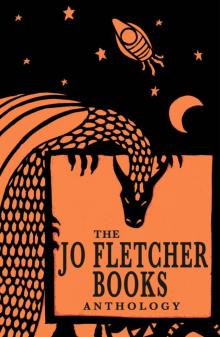 The Jo Fletcher Books Anthology
The Jo Fletcher Books Anthology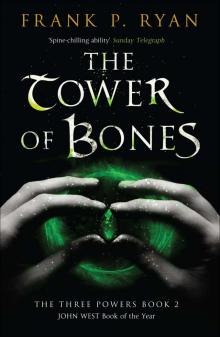 The Tower of Bones
The Tower of Bones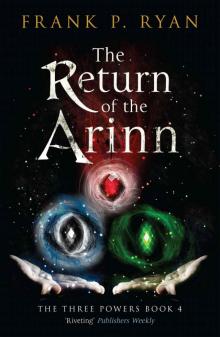 The Return of the Arinn
The Return of the Arinn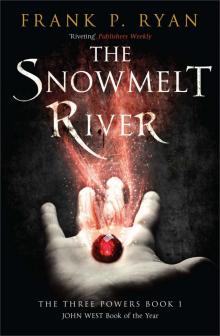 The Snowmelt River
The Snowmelt River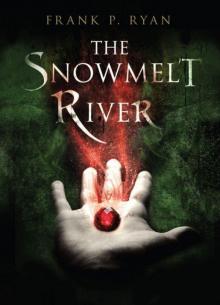 The Snowmelt River (The Three Powers)
The Snowmelt River (The Three Powers)